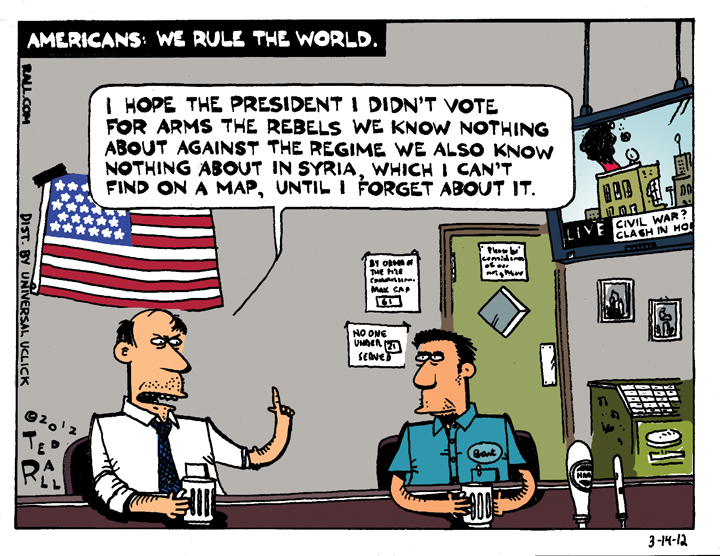No Context, But Propaganda Is Amusing
Try as they may to make the news as boring as possible, U.S. media outlets keep churning out hilarious “news” stories. Hardly a day passes without the release of some piece whose content is so ridiculous, its tone so absurdly credulous, that it makes us feel as if we live in a bizarre reincarnation of the propaganda-soaked Soviet Union.
Remember “Baghdad Bob”? Mohammed Saeed al-Sahhaf, Iraq’s information minister during the 2003 U.S. invasion, kept denying reality, insisting that Saddam’s regime was winning even as attacking tanks appeared in the background of his camera shots. I had a Baghdad Bob flashback moment earlier this week while listening to NPR’s afternoon news program “All Things Considered.”
“President Obama toured the U.S. Holocaust Museum in Washington today joined by Holocaust survivor, author and Nobel Laureate, Elie Wiesel. Mr. Obama said the U.S. must never again allow such atrocities to take place,” said Melissa Block.
Whaaaaa…?
The implication is that Obama cares about protecting innocent people from state-run mass murder. That the U.S. has moral standing. But…but…
The U.S. is currently the world’s leading perpetrator of atrocities!
American wars against Afghanistan and Iraq have slaughtered at least two million people and injured many millions more. The U.S. maintains a network of “black site” secret prisons and concentration camps around the world. President Obama claims the right to assassinate anyone, including U.S. citizens, anywhere in the world, without having to explain himself to a court. We’re the #1 arms dealer on the planet. And, as a British newspaper has learned, the military maintains dozens of secret drone bases here inside the U.S., obviously for future use against the enemies of our increasingly oppressive police state.
The Obama Administration isn’t killing as many people as were killed during the Holocaust—but that’s not saying much. Does NPR think we’ve forgotten that the hands of our political leaders are dripping with blood? Or is NPR trying to compete with Comedy Central?
The report included an Obama sound bite: “And when innocents suffer, it tears at our conscience. Elie alluded to what we feel as we see the Syrian people subjected to unspeakable violence simply for demanding their universal rights. We have to do everything we can.”
When innocents suffer. Well, not all innocents, right, Mr. President? Like, we’re not supposed to lose sleep over the thousands of detainees—including children—in U.S. concentration camps at Guantánamo, Bagram, Diego Garcia, Thailand, and Bulgaria. All of who are, under U.S. law, innocent of any crime (because they’ve never been charged, much less convicted, in court).
Anyway, it’s not like the U.S. is doing “everything we can” for the Syrian resistance. Not that we should. But coverage like this—it really does hearken back to the glory days of Pravda and Izvestia.
It’s bad enough to be fed propaganda. But at least make an effort when you lie. This crap is insulting.
In the same report, Don Gonyea let loose this howler: “Mr. Obama announced new sanctions against nations that commit grave human rights abuses through technology that includes cell phone tracking and monitoring citizens on the Internet.”
What a kidder! Such awesomely dry delivery!
As the San Francisco Chronicle reported: “The President took aim at Syria and Iran, whose leaders have tapped compliant phone companies and Internet services to hunt down dissenters.”
Listening to and reading that, you could almost forget that Obama voted for FISA, which retroactively legalized Bush’s illegal domestic wiretapping program, which was carried out by the National Security Agency and—ahem—compliant phone companies such as AT&T. FISA also radically expanded the federal government’s right to listen to your phone calls and intercept your email without a warrant.
Obama’s own commission of “grave human rights abuses through technology that includes cell phone tracking and monitoring citizens on the Internet” is context worth mentioning in a story about Obama imposing sanctions on other countries that do the same things. Maybe something like this: “Mr. Obama, whose Administration vigorously asserts its right to track Americans’ cell phones and track them on the Internet, announced sanctions against other countries that do the same thing.”
They wouldn’t be telling us anything we didn’t already know. But here’s the thing—as ignorant and stupid as the American public is, the media thinks we’re even stupider and more ignorant!
If nothing else, our neo-Soviet media sure is funny.
(Ted Rall’s next book is “The Book of Obama: How We Went From Hope and Change to the Age of Revolt,” out May 22. His website is tedrall.com.)

